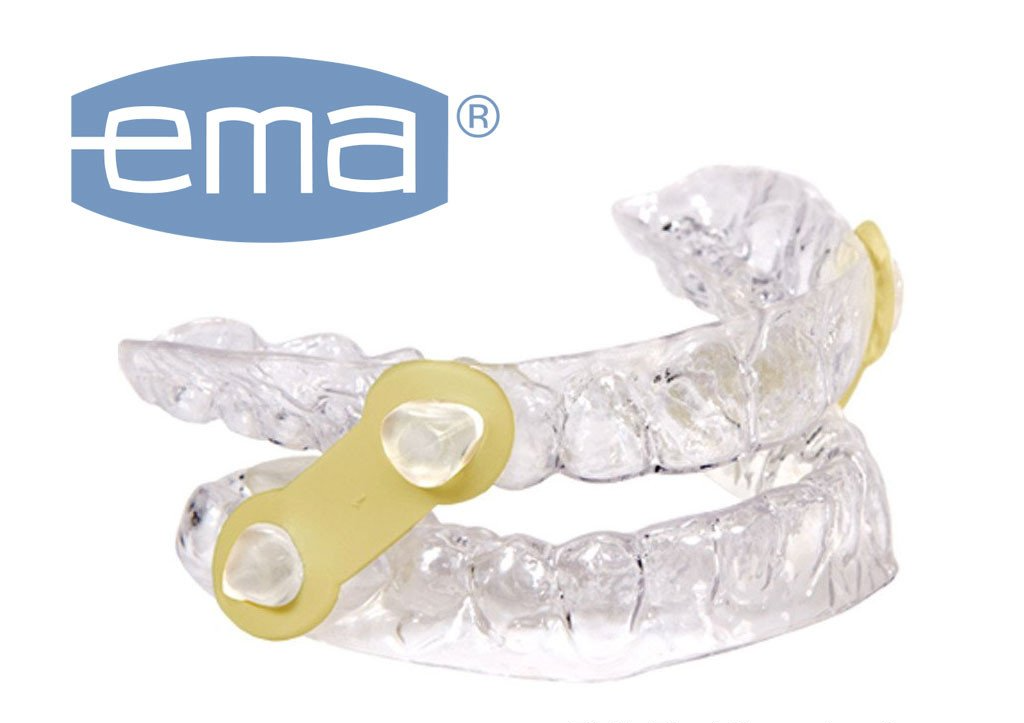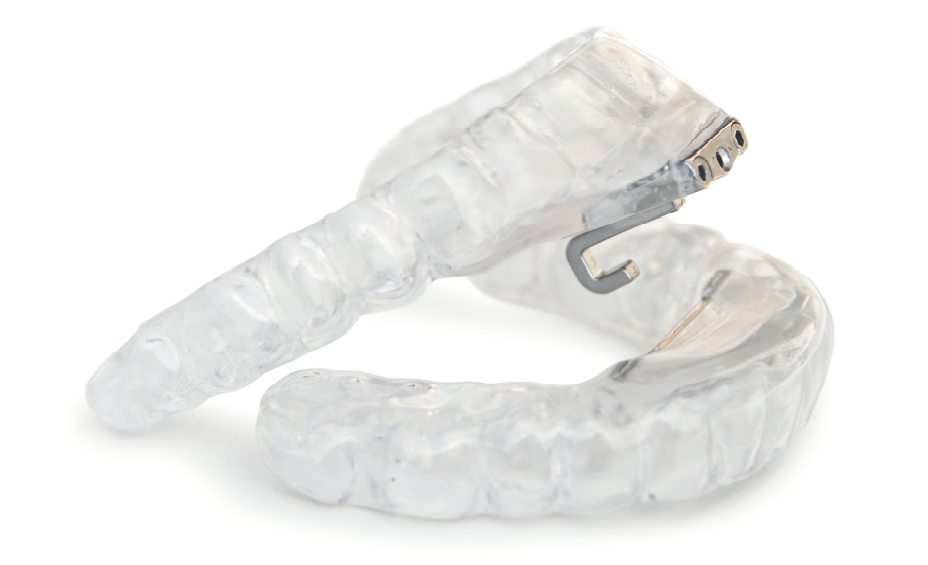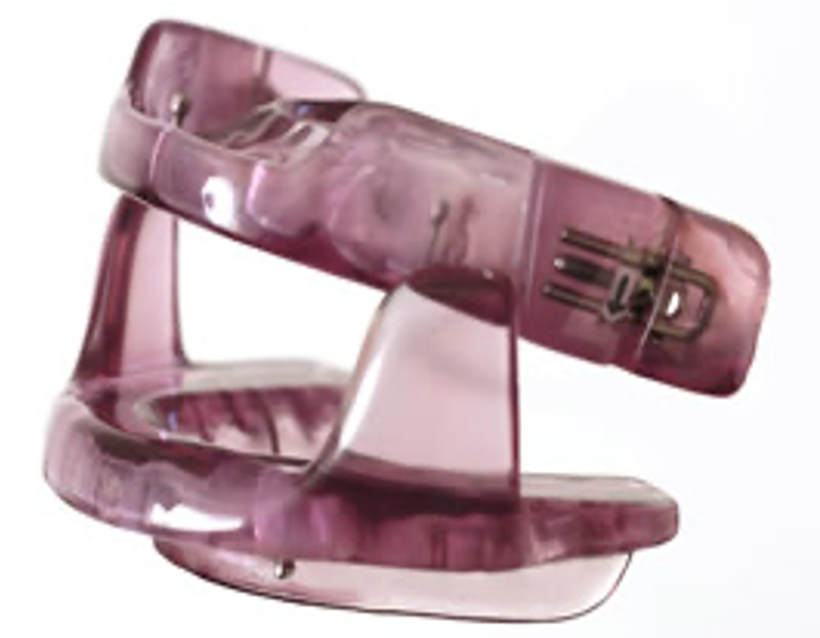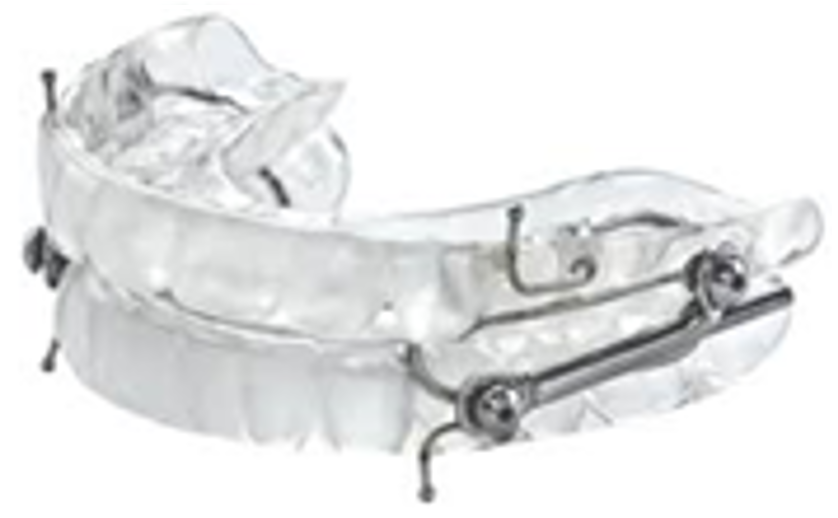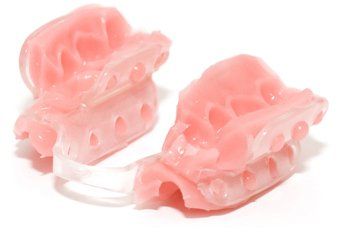Oral Appliance Therapy for Sleep Apnea
The Center for Sleep Apnea and TMJ is a dental clinic dedicated to helping you with sleep apnea, snoring, and TMJ pain. It’s time to smile again as you finally get a good night’s rest!
Sleep Treatments
Oral appliances are simple in how they function as sleep treatments. An oral appliance keeps the airway open by keeping the lower jaw and tongue from falling back and blocking the airway. This is similar to the “head tilt, chin lift” procedure taught in CPR classes. While there are many appliances on the market, they all basically do the same thing—keep the airway open by preventing the jaw from falling back.
Oral appliances are made out of a variety of materials—most of which are adjustable. The sleep treatment appliance's being adjustable is important so that an effective jaw position can be found. In our center for sleep and TMJ patients are routinely scheduled for follow up sleep studies during which the appliance can be adjusted by the sleep technician to ensure that the appliance is working as well as possible.
Types of Appliances
ELASTIC MANDIBULAR ADVANCEMENT (EMA)
The EMA (Elastic Mandibular Advancement) appliance is one of the most comfortable and adjustable appliances on the market. The EMA is easily adjusted by using different lengths of bands. The bands also come in different levels of hardness or flexibility allowing for significant customization of the fit and feel of the appliance. There is nothing in the way of the tongue at the front of the appliance. It is available in a traditional acrylic design or an upgraded 3D printed nylon material.
HOOK STYLE APPLIANCES
Hook style appliances are great for people that are missing their molar teeth. They incorporate a hook and bar system that keeps the jaw from moving back. The hook is on a track system which allows adjustment of the jaw position. These appliances are also nice for combination therapy with CPAP for people who cannot keep their mouth closed.
DORSAL STYLE APPLIANCES
Dorsal style appliances have a distinct advantage of having the upper and lower pieces not hook together. This allows for people to open their mouth fully if needed. This appliance is great for people missing multiple teeth, that wear dentures or who have claustrophobic concerns.
HERBSTS STYLE APPLIANCES
Dorsal style appliances have a distinct advantage of having the upper and lower pieces not hook together. This allows for people to open their mouth fully if needed. This appliance is great for people missing multiple teeth, that wear dentures or who have claustrophobic concerns.
SILENT SLEEP
A non-custom, sleep treatment appliance invented by Dr. Spencer. It is very comfortable and costs less than custom made appliances, as there is no need for impressions of the teeth, creation of models, and custom lab fabrication. The disadvantage of the Silent Sleep is that the jaw position cannot be adjusted by the patient. This may mean several office visits are needed to find the best position. The Silent Sleep is used mostly for simple snoring cases. The Silent Sleep is far more comfortable and less bulky than appliances seen on TV like the Pure Sleep. Buying an appliance on TV or through the internet should be avoided since there is no contact with a dentist and oral appliances can have negative dental side effects—especially when there is no follow up. If you’ve tried a TV appliance and it helped but you couldn’t stand to use it (due to bulkiness or comfort issues), then a Silent Sleep or a custom appliance like the EMA may be indicated.
Oral Appliances provide an effective treatment option for sleep apnea in Idaho. They look similar to an orthodontic retainer and are custom-made to fit the user’s mouth, jaw, and teeth. By positioning your tongue and holding the jaw in a slightly forward position, oral appliance therapy can dramatically reduce snoring and improve overall sleep quality. It’s often recommended by dental professionals for mild to moderate levels of sleep apnea — not just snoring. Oral appliance therapy is much more comfortable than CPAP machines since it doesn't require sleeping with a mask or machine. Plus, there's no need to worry about refilling water reservoirs or maintaining costly machinery either! With oral appliance therapy, you get a safe, non-invasive solution that fits into your daily lifestyle.
At The Center for Sleep Apnea & TMJ, our team understands the difficulty of finding the right oral device for sleep apnea. Our specially trained technicians provide you with a tailor-made oral appliance for your specific needs. Our sleep apnea doctor in Idaho offers high-quality oral appliances specific to treating sleep apnea in Boise and its surrounding areas. Our devices are designed and tested to meet the qualifications set forth by the American Academy of Dental Sleep Medicine.
With highly trained and qualified staff, we provide the highest standard in oral care for those suffering from sleep apnea so that you can rest assured your oral device will fit comfortably. For those in Boise searching for a mouth appliance for sleep apnea, The Center for Sleep Apnea & TMJ are here to help.
Stop suffering from Sleep Apnea. Find out how we can help.
Is sleep apnea genetic?
What are my treatment options?
What is AHI?

